- Home
- Joseph Bruchac
Flying with the Eagle, Racing the Great Bear Page 7
Flying with the Eagle, Racing the Great Bear Read online
Page 7
Then Sun dressed them in armor made of flint and lowered the two boys down to earth on a bolt of lightning.
When they stepped off the bolt, they were on top of Tsoodzil, Mount Taylor. As they walked down the south side of the mountain, they came to a high wall of stones.
“Brother,” said Born of Water, “let us try our weapons and see how strong they are.”
“That is good,” said Monster Slayer.
So they shot their arrows. The lightning that strikes straight and the lightning that strikes crooked shattered the cliff, making a big cleft in it.
“We will do well with these weapons,” Born of Water said.
As they walked down the mountain, they heard a rumbling like the sound of an earthquake. It was the giant Yeitso, who had smelled their scent and was coming to look for them, walking in a great circle around the hills. First they saw the top of his head over the hills to the east; then they saw his head and shoulders over the hills to the south. The ground shook even harder, and they saw the whole upper half of his body over the hills to the west. Finally the giant stood before them, just on the other side of Blue Water Lake. He bent over and drank until the lake was almost empty.
Born of Water and Monster Slayer stood upon a bent rainbow, and their reflections showed in the remaining water of the lake.
“What are these handsome little things?” Yeitso growled. “Why have I not seen them before, and how shall I kill them?”
Wind came to the shoulders of the twins and whispered to them. “Throw his words back to him.”
“What is this big thing and why have we never seen him before?” the twins said. “How shall we kill him?”
Yeitso roared and fired an arrow at the boys. The bent rainbow on which the boys stood straightened, and the arrow passed over their heads. Yeitso fired a second bolt and the rainbow arced again. This time the giant’s arrow passed beneath their feet. The giant’s third arrow went to their left, his fourth to their right.
Then Born of Water shot his arrow. The lightning that strikes crooked hit Yeitso and knocked him back. Monster Slayer shot his arrow, and the lightning that strikes straight knocked Yeitso down and killed him. His flint scales shattered from his body and scattered all over the land.
“That flint will be useful to our people in the future,” Monster Slayer said. Then the two brothers cut off the giant’s head to make sure he would not come back to life again. As soon as they did so, Yeitso’s blood began to flow down the valley.
“If his blood goes far enough, Yeitso will return to life,” Wind whispered to the brothers. Quickly Monster Slayer cut a line in the rock and stopped the flow. Yeitso’s blood dried and it remains there to this day, though the newcomers call it beds of lava.
Monster Slayer and Born of Water went home to Changing Woman. She did not believe what she was told until they showed her Yeitso’s broken arrows, which they had brought with them. Soon the two brothers set forth again to slay the other monsters. They killed the One Who Kicks People off the Cliffs; they killed the Monster Bird, the Eyes That Slay, the Bear That Pursues, and the Rolling Rock. Then they made a huge storm sweep across the land in the place where the monsters hid. When the storm ended, a great canyon existed where the many terrible creatures had once been. Today it is called the Grand Canyon by the newcomers.
“Now,” Monster Slayer said, “we have killed all of the monsters that threatened the People.”
But Wind came and whispered in Monster Slayer’s ear, “Four still remain to bring death and trouble to the People.”
So Monster Slayer and Born of Water set out to finish the work they had begun. They traveled in the direction Wind told them to go, toward the north. At last they found a cavern and went inside. This was the place where they would find the last ones that would trouble the Diné .
“Here is one of them,” Born of Water said, standing over an old man who crouched in a corner with an empty bowl. “It is Dichin.” And indeed it was so. The old man was Dichin, whose name means “Hunger.”
“I will kill you,” said Monster Slayer. “Then the People will never again feel the pain of hunger.”
“Do not kill me,” said the old man. “It is hunger that makes food enjoyable. Without hunger the People would have no reason to go out and hunt for their food.”
“This is true,” said Monster Slayer. “We will spare you.”
“Here,” cried Born of Water, indicating an old woman wrapped in a blanket. “Here is one to slay. This is Hakaz Estan, Cold Woman.”
Monster Slayer lifted up his hand. “Then she must die. No longer will the People shiver from the cold.”
“No,” said Cold Woman, “I am needed. Without me, the springs will dry up. The land will be too hot and the People will not survive.”
“You are right,” Monster Slayer said. “We must spare you also.”
“This one here,” Born of Water cried. “This one here with the ragged clothing is Tgaei. Surely it is right that we should destroy Poverty.”
But Tgaei spoke up as the others had. “Without me, old things will never wear out. It will not be well for the People in the days to come if there is no poverty. Old things must wear out for there to be new ones.”
“Then we shall spare you as well,” Monster Slayer said.
“Brother,” said Born of Water, “this old, old woman leaning on her stick is Sa. Old Age must be killed so that the People will not have to grow old and die.”
But Old Age held up her hand. “No,” Sa said, “you must not destroy me. Without old age, people will not appreciate their lives. Let there be old age so that new people will have space to come into the world.”
Again Monster Slayer and Born of Water had to agree. And so it is that hunger and cold, poverty and old age remain with us to this day.
Then Monster Slayer and Born of Water returned to their father, the Sun. They gave back their borrowed weapons, for the twins had done their work. But they were told that if they needed those weapons once more to save the People from monsters, they would be welcome in the house of their father to receive his help.
So it happened long ago, but the People say that the Hero Twins still have their dwelling in the valley of the San Juan River. Sometimes, when Diné men go to war, they go to that valley to pray for help from the Hero Twins. And if those old monsters—or new ones—come to threaten the lives of the People, the Diné know that the Hero Twins will visit the house of their father again.
The Bear Boy
Pueblo
Long ago, in a Pueblo village, a boy named Kuo-Haya lived with his father. But his father did not treat him well. In his heart he still mourned the death of his wife, Kuo-Haya’s mother, and did not enjoy doing things with his son. He did not teach his boy how to run. He did not show him how to wrestle. He was always too busy.
As a result, Kuo-Haya was a timid boy and walked about stooped over all of the time. When the other boys raced or wrestled, Kuo-Haya slipped away. He spent much of his time alone.
Time passed, and the boy reached the age when his father should have been helping him get ready for his initiation into manhood. Still Kuo-Haya’s father paid no attention at all to his son.
One day Kuo-Haya was out walking far from the village, toward the cliffs where the bears lived. Now, the people of the village always knew they must stay away from these cliffs, for the bear was a very powerful animal. It was said that if someone saw a bear’s tracks and followed them, he might never come back. But Kuo-Haya had never been told about this. When he came upon the tracks of a bear, Kuo-Haya followed them along an arroyo, a small canyon cut by a winding stream, up into the mesas. The tracks led into a little box canyon below some caves. There, he came upon some bear cubs.
When they saw Kuo-Haya, the little bears ran away. But Kuo-Haya sat down and called to them in a friendly voice.
&nb
sp; “I will not hurt you,” he said to the bear cubs. “Come and play with me.”
The bears walked back out of the bushes. Soon the boy and the bears were playing together. As they played, however, a shadow came over them. Kuo-Haya looked up and saw the mother bear standing above him.
“Where is Kuo-Haya?” the people asked his father.
“I do not know,” the father said.
“Then you must find him!”
So the father and the other people of the pueblo began to search for the missing boy. They went through the canyons calling his name. But they found no sign of the boy there. Finally, when they reached the cliffs, the best trackers found his footsteps and the path of the bears. They followed the tracks along the arroyo and up into the mesas to the box canyon. In front of a cave, they saw the boy playing with the bear cubs as the mother bear watched them approvingly, nudging Kuo-Haya now and then to encourage him.
The trackers crept close, hoping to grab the boy and run. But as soon as the mother bear caught their scent, she growled and pushed her cubs and the boy back into the cave.
“The boy is with the bears,” the trackers said when they returned to the village.
“What shall we do?” the people asked.
“It is the responsibility of the boy’s father,” said the medicine man. Then he called Kuo-Haya’s father to him.
“You have not done well,” said the medicine man. “You are the one who must guide your boy to manhood, but you have neglected him. Now the mother bear is caring for your boy as you should have done all along. She is teaching him to be strong as a young man must be strong. If you love your son, only you can get him back.”
Every one of the medicine man’s words went into the father’s heart like an arrow. He began to realize that he had been blind to his son’s needs because of his own sorrow.
“You are right,” he said, “I will go and bring back my son.”
Kuo-Haya’s father went along the arroyo and climbed the cliffs. When he came to the bears’ cave, he found Kuo-Haya wrestling with the little bears. As the father watched, he saw that his son seemed more sure of himself than ever before.
“Kuo-Haya,” he shouted. “Come to me.”
The boy looked at him and then just walked into the cave. Although the father tried to follow, the big mother bear stood up on her hind legs and growled. She would not allow the father to come any closer.
So Kuo-Haya’s father went back to his home. He was angry now. He began to gather together his weapons, and brought out his bow and his arrows and his lance. But the medicine man came to his lodge and showed him the bear claw that he wore around his neck.
“Those bears are my relatives!” the medicine man said. “You must not harm them. They are teaching your boy how we should care for each other, so you must not be cruel to them. You must get your son back with love, not violence.”
Kuo-Haya’s father prayed for guidance. He went outside and sat on the ground. As he sat there, a bee flew up to him, right by his face. Then it flew away. The father stood up. Now he knew what to do!
“Thank you, Little Brother,” he said. He began to make his preparations. The medicine man watched what he was doing and smiled.
Kuo-Haya’s father went to the place where the bees had their hives. He made a fire and put green branches on it so that it made smoke. Then he blew the smoke into the tree where the bees were. The bees soon went to sleep.
Carefully Kuo-Haya’s father took out some honey from their hive. When he was done, he placed pollen and some small pieces of turquoise at the foot of the tree to thank the bees for their gift. The medicine man, who was watching all this, smiled again. Truly the father was beginning to learn.
Kuo-Haya’s father traveled again to the cliffs where the bears lived. He hid behind a tree and saw how the mother bear treated Kuo-Haya and the cubs with love. He saw that Kuo-Haya was able to hold his own as he wrestled with the bears.
He came out from his hiding place, put the honey on the ground, and stepped back. “My friends,” he said, “I have brought you something sweet.”
The mother bear and her cubs came over and began to eat the honey. While they ate, Kuo-Haya’s father went to the boy. He saw that his little boy was now a young man.
“Kuo-Haya,” he said putting his hands on his son’s shoulders, “I have come to take you home. The bears have taught me a lesson. I shall treat you as a father should treat his son.”
“I will go with you, Father,” said the boy. “But I, too, have learned things from the bears. They have shown me how we must care for one another. I will come with you only if you promise you will always be friends with the bears.”
The father promised, and that promise was kept. Not only was he friends with the bears, but he showed his boy the love a son deserves. And he taught him all the things a son should be taught.
Everyone in the village soon saw that Kuo-Haya, the bear boy, was no longer the timid little boy he had been. Because of what the bears had taught him, he was the best wrestler among the boys. With his father’s help, Kuo-Haya quickly became the greatest runner of all. To this day, his story is told to remind all parents that they must always show as much love for their children as there is in the heart of a bear.
The Ghost Society
Yuki
It was not yet morning, but Walks Slow could not sleep. If he was right, as soon as the morning light arrived, the men would enter the han and take him. They would spend the day making him ready, and then in the evening they would go to the iwl-han, the dance house. There, Walks Slow—if he was one of the boys chosen this time—would be initiated into the Hulk’ilal-woknam, the Ghost Society. To belong to the Ghost Society meant that a boy was no longer a little child. He was one who had been taught the things that were needed to become a man. Still, the thought of having to face the powerful beings who came to do that initiation, beings who looked something like the older men of his village but who were actually powerful ghost spirits, worried Walks Slow.
This will happen, he thought. It was the right time of year, the season known as the Moon When Acorns Get Ready to Drop. He had seen the signs that preparations were taking place for the ceremony, even though no one spoke openly about it. It had been three winters since the last Hulk’ilal-woknam. And there was one every fourth year. Walks Slow was sure he would be chosen. He was old enough. He had seen three handfuls of winters. He was one of the boys who was praised for his ability to do things that helped the people. He was strong, a good hunter, a good runner. After the Hulk’ilal-woknam, he would be even stronger, even better at running and hunting. Surely he would be chosen.
Walks Slow had been through the Taikomol initiation three winters ago. They had taken him with the other children to the dance house early in the morning, and he had sat straight without moving from dawn till the middle of the day, hearing the old man with his cocoon rattle and eagle feather tell them the stories of creation that all true Yuki must know. Shum-hohtme, “Big Ear,” was the old man’s name, and he was a powerful man. His tellings of the ancient tales make them come alive in the darkened dance house.
Walks Slow’s mother and father were behind him throughout the whole initiation, ready to prop him up if he wavered from his cross-legged stance or fell back as children sometimes did. But he sat straight and listened, taking into his memory every word.
Although he had done well then, he was still worried. He lay near the back of the house with his head close to the center post of their han, looking up at the roof overhead, the interlaced poles that were well covered with bark. The light flickered from the firepit, and a few sparks rose up like new stars going into the sky. He could see the entrance tunnel into their house, the woven basket door still closed. Soon it would be pushed aside and the men would enter. His hands were trembling. Walks Slow tried to calm his mind by thinking of the story old Shum-hoht
me had told of how it all began, how the world was made, how the Taikomol-woknam came to be.
Even Taikomol, “He Who Walks Alone,” made mistakes. It was from the north that Taikomol came. There was only water, no land, and Taikomol made land upon it. He built the first iwl-han on that land. He made human beings from sticks. But he had done this too quickly. The land sank, and the dance house and the first people sank with it. Again Taikomol was alone, with nothing but water around him.
So Taikomol created another world. There was no sun yet and no daylight and Taikomol had made no game animals to eat. In the darkness, the people hunted and ate one another. Things did not go right in that world. Fire came into it and burned everything up, even the water.
At last Taikomol made one more world. This time he started from the north and then extended it to the southeast. He made the sun, and daylight shone on the land. The land was new, white, and clean. He walked to the south, and as he walked, he saw the land stretching farther than he could see. But the land was not yet finished. Taikomol made rivers flow and mountains rise up. Then he built another dance house. The world swayed like a log floating in the water. The ground was not firm beneath it. Taikomol made a great elk, a great deer, a great coyote. He placed them in the north of the new land, but the land continued to move.
“Lie down and hold this earth firm,” he said. They did so, and the land stopped swaying. As long as they lie still, the land is firm, but whenever one of them forgets and stands up again, the earth shakes. To this day, when earthquakes come, the people say it is because those animals are not lying still.
Then Taikomol went into his dance house. He planted sticks on the floor. “You will wake up as human beings and have a feast,” Taikomol said. Then he went outside and stood at the door of the dance house. He waited all night. When it was morning, the sound of many voices talking came from inside the dance house. At last the first human beings emerged.

 Peacemaker
Peacemaker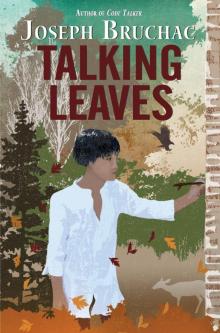 Talking Leaves
Talking Leaves Found
Found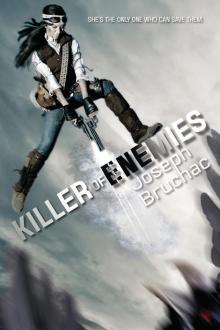 Killer of Enemies
Killer of Enemies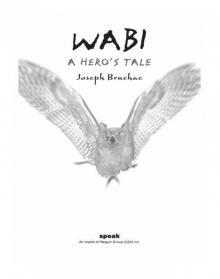 Wabi
Wabi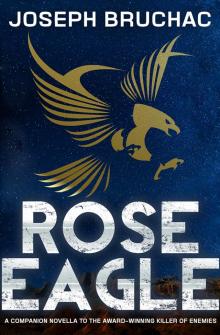 Rose Eagle
Rose Eagle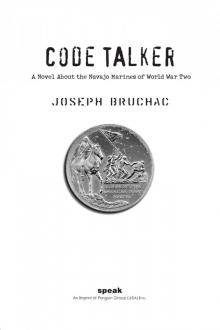 Code Talker
Code Talker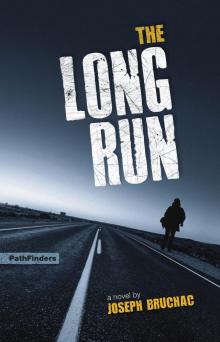 The Long Run
The Long Run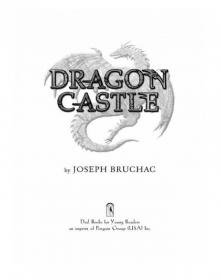 Dragon Castle
Dragon Castle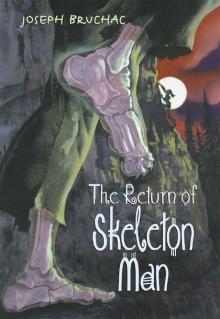 The Return of Skeleton Man
The Return of Skeleton Man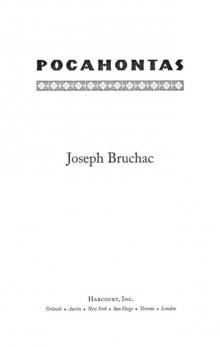 Pocahontas
Pocahontas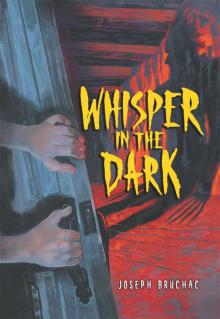 Whisper in the Dark
Whisper in the Dark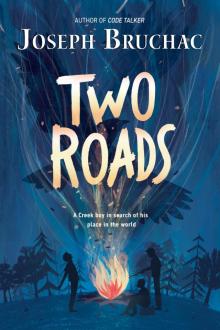 Two Roads
Two Roads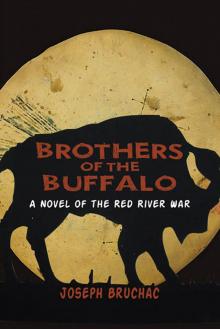 Brothers of the Buffalo
Brothers of the Buffalo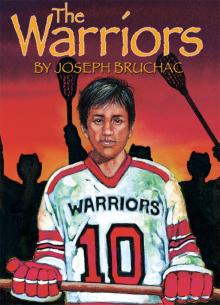 The Warriors
The Warriors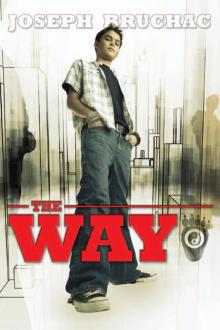 The Way
The Way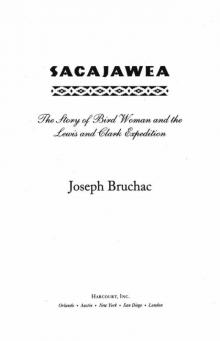 Sacajawea
Sacajawea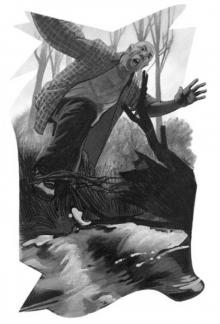 Night Wings
Night Wings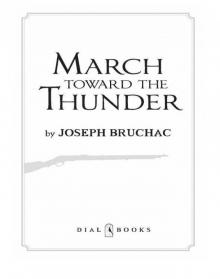 March Toward the Thunder
March Toward the Thunder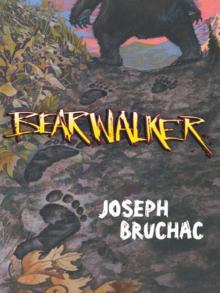 Bearwalker
Bearwalker Skeleton Man
Skeleton Man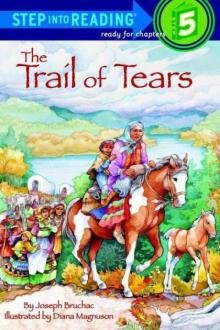 The Trail of Tears
The Trail of Tears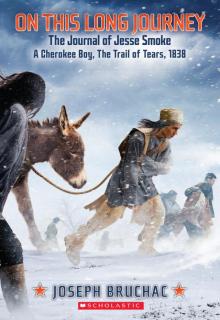 On This Long Journey
On This Long Journey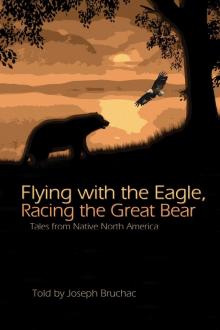 Flying with the Eagle, Racing the Great Bear
Flying with the Eagle, Racing the Great Bear